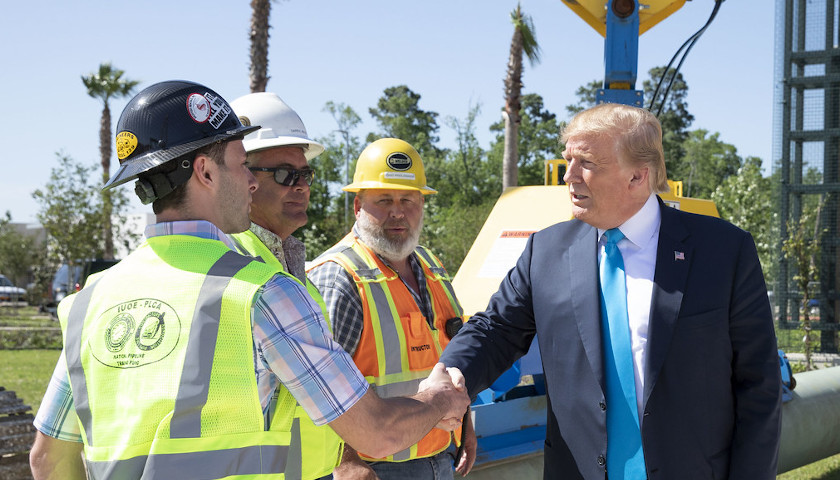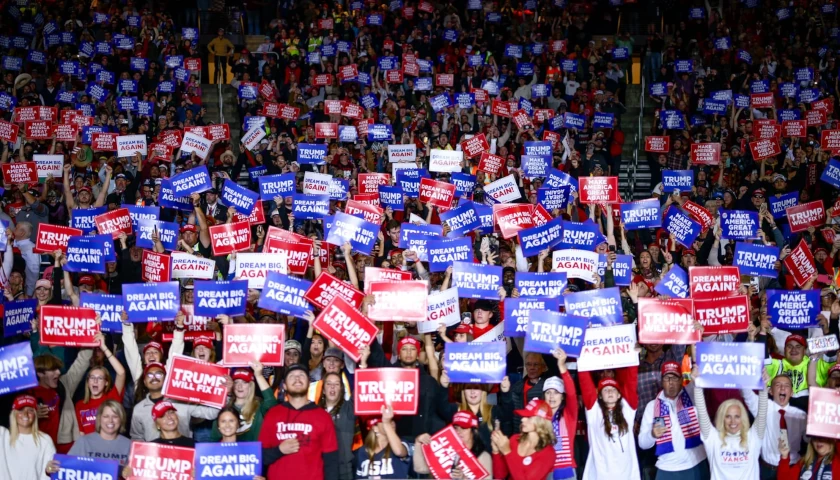by Edward Ring
The war for the soul of America is mirrored in the war for the soul of its major political parties. The establishment Democrats contend with a progressive insurgency and the establishment Republicans contend with a populist America First insurgency. But above all, the corporate bipartisan glue that connects the establishment Democrats to the establishment Republicans means they have more in common with each other than with their respective insurgencies.
Polling and voting results indicate that more than nine out of 10 registered Republicans consistently favor the America First policies ignited by Donald Trump. On the other hand, the loss of seats in the House of Representatives by Democrats in November suggests that most registered Democrats would support a Republican before they’ll support the democratic socialist agenda.
Both factors—that Republican voters overwhelmingly embrace America First principles and reject globalism, and that a large fraction of Democratic voters apparently reject far-Left ideology—make the Democratic Party the new and principal home of the establishment, and hence more attractive to billionaire donors and corporate multinationals.
America’s billionaires and boardroom titans also realize that it is easier to co-opt a far-Left agenda, particularly with respect to social issues where they can, for example, exploit the synergy between “diversity” mandates and open borders, or environmentalist mandates which disproportionately harm small, emerging, potential competitors. Hiding behind this moral rhetoric, they amass more profit and power. There is no such opportunistic synergy to be had with Republican “America First” voters, no inauthentic gambit to exploit, so of course the big money now goes to Democrats.
So which party now authentically represents the American worker? The Democrats, which is now the party of billionaires? Or Republicans, whose voters have rejected the monied elites that once ran their party, and have attracted a rainbow coalition of working-class voters?
Do America’s Unions Care About American Workers?
This question of which political party in America is more likely to implement policies that benefit the American worker should be one of the very first preoccupations of America’s union leadership. For the past several decades, including this most recent election, 90 percent of political contributions from America’s unions went to support Democrats.
But why now? For the first time ever, unions have a political alternative in the America First movement. Now there is a movement and an American president, who has successfully implemented policies that have benefit workers instead of investors; labor instead of capital. In core areas, immigration, trade, and environmental policy, Trump’s actions have helped American workers. If union leaders did not notice, union workers did.
As Politico reported in September, “despite a bevy of national union endorsements for Biden and years of what leaders call attacks on organized labor from the Trump administration, local officials in critical battleground states said support for Trump remains solid.”
Without a doubt, growing union membership depends on a union-friendly labor secretary and a union-friendly majority on the U.S. Supreme Court. Trump delivered neither of those things, so why was he popular with union members?
Democratic strategists and liberal pundits would claim that union workers are won over by Trump’s alleged xenophobia—that they are anti-immigrant. This is a predictable and convenient way of excusing what really happened. As the multinational corporate establishment wormed its way into controlling both political parties, U.S. policies increasingly harmed the American worker. The evidence is written across the decades: Offshoring jobs, importing cheap immigrant labor, and undermining key sectors of the economy in the name of protecting the environment. But why would unions stand for this?
Part of it is their historical ties to the Democratic Party. Part of it, to be sure, is the Republican Party’s commitment—albeit half-hearted commitment—to right-to-work laws and in general to reining in the power of organized labor. But there’s much more to this picture. America’s union leadership knows that if workers’ wages and benefits improve thanks to government policies, rather than as a result of union negotiations and strikes, then unions will become irrelevant.
This hidden agenda may explain why unions won’t publicly admit that increasing the supply of labor lowers the value of labor, or that offshoring jobs—and shutting down coal mining and fracking—destroys the lives and livelihoods of workers. All of that is true, but these hardships drive desperate workers to resort to the collective power of unions.
The worse things get, the more workers will turn to a union. In other words, for unions, bad times for their members are good for their business model.
How America’s Unions Could Help the America First Movement
The only way America’s union leadership would renounce this cynical calculation is if members demand change. America’s union leadership has two simple choices to make. First, are they fighting for the American worker, or are they fighting for all the workers in the world? Second, are they willing to shut down American jobs and further corrode American economic security in order, supposedly, to save the environment—or are they committed to a balanced approach that creates millions of jobs and adds trillions of dollars to the economy?
In both of these choices, American unions are choosing between nationalism and globalism.
But the moral case they might make for globalism is thin. It doesn’t benefit the rest of the world if America becomes such a hollow shell of an economy that it can no longer exert global leadership. It doesn’t benefit the vast majority of foreign workers if a small percentage of them migrate to the United States. It doesn’t help the ability of emerging economies, anywhere, if cheap and clean fossil fuel is not developed and used, everywhere. And it certainly doesn’t benefit anyone if the United States bans fossil fuel, but China, India, Indonesia, Pakistan, Nigeria, Brazil, and every other demographic heavyweight nation on earth keeps on using it.
The point here is that the moral argument for globalism may sound good—we all want to see everyone on earth achieve prosperity as soon as possible—but its implementation is rotten. Globalism as it is envisioned today by corporate multinationals is little more than economic imperialism. The Left used to understand that. Perhaps the far Left still does. But the establishment Democratic Party either does not understand this or they understand it perfectly well but want the donations to keep pouring in from their corporate allies.
The good news for unions, if they’re willing to stand up for the American worker again, is that by embracing realistic restrictions on immigration and supporting an approach to environmental policy that balances the needs of the planet with the needs of the workers they represent, they’re not making a moral compromise.
The vast majority of workers in the rest of the world are indifferent to the question as to whether a minute percentage of them can or cannot emigrate to the United States. The development of cheap and clean fossil fuel is an all-of-the-above energy strategy that will more rapidly lift everyone in the world out of poverty. In turn, that will slow population growth and ultimately help the environment. Soon enough, leapfrog technologies such as fusion energy will power the world, and the unwarranted panic over using fossil fuel will be forgotten.
Unions in the United States should reassess their political allegiances. Are they truly willing to continue to support a political party dominated by corporate globalists whose power and profits depend on reducing the standard of living of American citizens? Or will they demand America First policies on immigration, trade, and the environment? To do so would restore their credibility with their membership, and, given their not inconsiderable political clout, hasten the day when America’s politicians and political bureaucracies are again responsive to ordinary Americans.
– – –
Edward Ring is a senior fellow of the Center for American Greatness and co-founder in 2013 of the California Policy Center.





